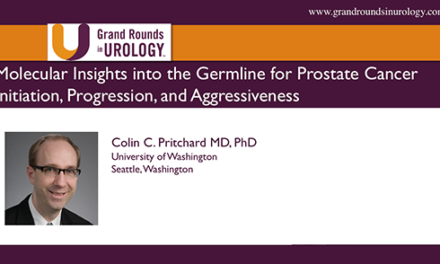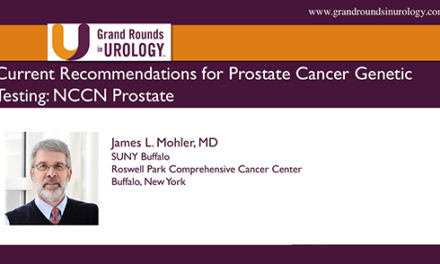Veda N. Giri, MD, presented “Implementation of Germline Testing for Prostate Cancer: Philadelphia Prostate Cancer Consensus Conference 2019” for the Grand Rounds in Urology audience in July, 2020. After her presentation, she was interviewed on the topic by E. David Crawford, MD, Editor-in-Chief of Grand Rounds in Urology (see second video, below).
Main Presentation – Summary:
Veda N. Giri, MD, Director of Cancer Risk Assessment and Clinical Cancer Genetics at the Sidney Kimmel Cancer Center of Thomas Jefferson University, discusses the issues raised and the decisions reached about the implementation of germline testing at the 2019 Philadelphia Prostate Cancer Consensus Conference. She observes that the increasing indications for and rising role of genetic testing in prostate cancer have presented challenges to a field that has somewhat limited experience in this area. Dr. Giri summarizes the conclusions the voting participants came to, including recommendations on who should receive germline testing, which genes should be prioritized for testing, and who should be enrolled in precision medicine trials, among other topics. She particularly emphasizes the need for practices to be aware of, what should be discussed with men in terms of informed consent, and to have connections with genetic counselors in place so they can easily refer patients.
Q&A – Summary:
E. David Crawford, MD, Professor of Urology at the University of California, San Diego, asks Veda N. Giri, MD, Director of Cancer Risk Assessment and Clinical Cancer Genetics at the Sidney Kimmel Cancer Center of Thomas Jefferson University, several follow-up questions about her presentation, “Implementation of Germline Testing for Prostate Cancer: Philadelphia Prostate Cancer Consensus Conference 2019.” When asked about how to decide which laboratory and which panel to use, Dr. Giri explains that it is important to use an experienced lab with strong policies in place for communicating about gene variant reclassifications and for handling insurance, and also notes that different patients will require different panels, depending on how much information they want. Dr. Crawford then asks about how to respond to patients who believe they are not at risk because of the results of commercial genetic tests like 23andMe, and Dr. Giri emphasizes that such tests are not comprehensive for mutations like BRCA. The conversation concludes with a discussion of whether online genetic counseling can fill in the gaps left by the shortage of genetic counselors.
For more information on genetic & germline testing for prostate cancer, visit our Next Generation Genomics & Biomarkers Learning Center.
How to cite: Giri, Veda N. “Implementation of Germline Testing for Prostate Cancer: Philadelphia Prostate Cancer Consensus Conference 2019” July, 2020. Accessed Jul 2025. https://grandroundsinurology.com/implementation-of-germline-testing-for-prostate-cancer-philadelphia-prostate-cancer-consensus-conference-2019/
ABOUT THE AUTHOR
Veda N. Giri, MD is a medical oncologist specializing in clinical cancer genetics. Dr. Giri is Division Chief of Clinical Cancer Genetics for Yale School of Medicine and Assistant Director of Clinical Cancer Genetics at Yale Cancer Center, where she leads an effort in cancer genetic evaluation for precision medicine, tailored cancer screening, and hereditary cancer assessment.
Dr. Giri has had a focused research interest in developing the field of genetic counseling and genetic testing for inherited prostate cancer. Dr. Giri started the first Men’s Genetic Risk Clinic in the US in 2014 focused on genetic evaluation of inherited prostate cancer in the setting of multidisciplinary care. Dr. Giri also co-chaired the 2017 and 2019 Philadelphia Prostate Cancer Consensus Conferences that addressed development of comprehensive frameworks for genetic evaluation and implementation of genetic testing for prostate cancer. She is the Principal Investigator of multiple grant-funded prostate cancer genetic evaluation studies spanning genetic counseling, genetic testing, disparities, behavioral science, and implementation research. Dr. Giri has vested interest to expand research to address the genetic evaluation needs of cancer patients and community populations.




